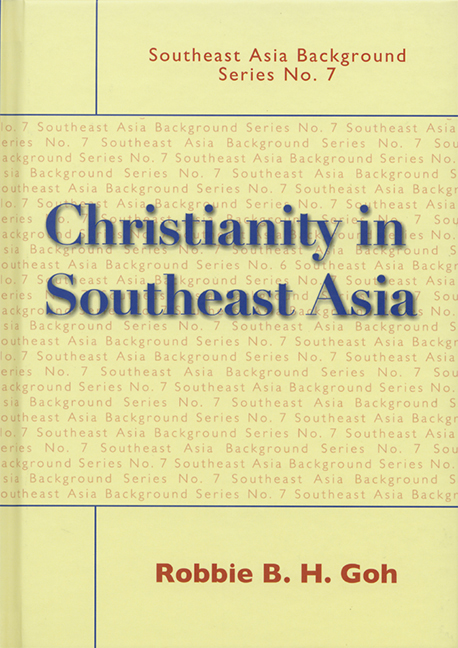Book contents
- Frontmatter
- Contents
- About the Author
- 1 Introduction: Missionary Movements and the Coming of Christianity to Southeast Asia
- 2 The Philippines
- 3 Singapore
- 4 Malaysia
- 5 Indonesia
- 6 Christianity in the Other Countries of Southeast Asia: Brunei, Myanmar, Thailand, Cambodia, Laos and Vietnam
- 7 Christianity in the Other Countries of Southeast Asia: Brunei, Myanmar, Thailand, Cambodia, Laos and Vietnam
- References
4 - Malaysia
Published online by Cambridge University Press: 21 October 2015
- Frontmatter
- Contents
- About the Author
- 1 Introduction: Missionary Movements and the Coming of Christianity to Southeast Asia
- 2 The Philippines
- 3 Singapore
- 4 Malaysia
- 5 Indonesia
- 6 Christianity in the Other Countries of Southeast Asia: Brunei, Myanmar, Thailand, Cambodia, Laos and Vietnam
- 7 Christianity in the Other Countries of Southeast Asia: Brunei, Myanmar, Thailand, Cambodia, Laos and Vietnam
- References
Summary
The story of Christianity in Malaysia is to a certain extent interwoven with that of Singapore, as the two countries were part of the same colonial administrative region before finally separating in 1965. The area of the Malay Peninsula, together with parts of the coastal region of the island of Borneo, which collectively make up the modern-day nation of Malaysia, had long been occupied by Malay fishermen, traders and agriculturalists when Hindu and Buddhist influences came to the region from the ninth century onwards (Ho 1996, p. 260). From the fourteenth century onwards, Islam became the dominant religion in the whole of the Malay archipelago, and became deeply ingrained into the Malay culture, identity and way of life. As with other parts of Southeast Asia, the Malay Peninsula (in particular, the northwestern part) had contact with the Eastern Church, probably in the seventh century, although little remains of this contact (Roxborogh 1992, p. 2). Portuguese traders brought the first enduring Christian presence when they captured and settled the port of Malacca on the west coast of the Malay Peninsula in 1511. As with other Portuguese settlements (such as in Macau and Goa), the Portuguese presence in Malacca consisted only of a small garrison, which was intended to guard the port rather than conquer and control a large territory in the hinterland. The result is that the Catholic influence introduced by the Portuguese did not have an extensive reach in the Peninsula, although it did establish an enduring community of Catholic Eurasians in and around Malacca itself.
In the seventeenth century, trade rivals — the Dutch — established themselves in the region, ousting the Portuguese from Malacca in 1641. Political and religious reasons led the Dutch to discourage Catholicism and promote their own Reformed Protestantism instead (Roxborogh 1992, pp. 7–8). However, Dutch commercial and political energies were largely concentrated in Indonesia, particularly after the Anglo-Dutch treaty of 1824, which carved out the respective areas of influence of the two colonial powers; this also meant that the Dutch had little lasting impact on Christianity in Malaysia.
- Type
- Chapter
- Information
- Christianity in Southeast Asia , pp. 47 - 56Publisher: ISEAS–Yusof Ishak InstitutePrint publication year: 2005

